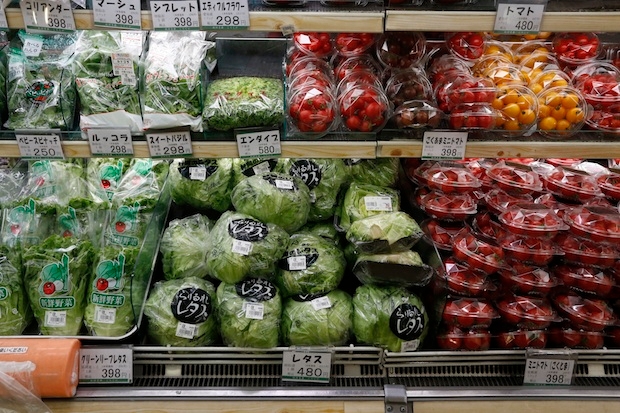The UK produces 3.6 million tonnes of plastic waste every year, 1.5 million tonnes of which takes the form of packaging that passes through households like mine. So the government has taken a stand. This week, large shops became required by law to charge 5p for every single-use plastic carrier bag they give out.
According to Defra, supermarkets gave out 8 billion, or 57,000 tonnes, of plastic bags in 2013. And I’m more than happy to embrace my ‘bag for life’. But how much difference will it really make, however, given the overabundance of plastic packaged products that will go inside it?
I call up a charity calked ‘Wrap’, which since 2005 has overseen The Courthauld Commitment, an agreement between grocery retailers and manufacturers to work towards the government’s goal of a ‘zero waste economy’. It’s had significant successes, including a 10 per cent drop in greenhouse gas emissions relating to packaging between 2010 and 2012. Still, they tell me, plastic carrier bags account for just 2.5 per cent of current plastic packaging waste.
So, how easy is it to take action yourself, and simply stop buying plastic packaged goods? Armed with just a jute bag, two crumpled old carrier bags and a crusading spirit, I head off to the supermarket to attempt an entirely plastic-packaging free weekly shop.
My mission starts well in the fruit and veg aisle. While almost everything is offered in a choice of plastic bag or plastic tray enveloped in a plastic wrapper, I find nearly everything I need being sold loose too. With carrier bags now carrying a penalty, it seems odd to be greeted every few paces by polythene bags in which to put this loose produce. Ignoring these, however, I soon have potatoes, broccoli, apples and pears rolling around in the bottom of my trolley (they will later get muddled up on the conveyer belt and the cashier will look daggers at me while weighing them).
Fearing my unpackaged tomatoes will get squashed (they do), I gravitate towards avocados and bananas with their own natural protection. I fail to summon up some righteous indignation at being deprived the opportunity to buy kale, which is only available in hard-to-recycle salad bags. It does seem wrong, though, that the cheapest ranges appear only to be available in plastic packaged forms.
It is in the meat aisle where things start to spiral. Everything on the shelves is off limits, so I head to the deli counter where unpackaged meat, fish and cheeses are lit up like a market mirage. The butcher, however, confirms that he’ll wrap anything I buy in plastic. ‘If I hand you this recycled plastic bag, could you put it in there instead?’ I ask. Bemusement follows, before a manager emerges to inform me that no, it can’t be done, due to risk of ‘cross contamination behind the counter.’
The dairy aisle is a disaster too. All yoghurt is housed in a plastic pot. Milk is sold exclusively in plastic cartons, except the vegan ones which are packaged in ‘board from responsible sources’, meaning I buy a soy one which my husband eyes resentfully all week while opting for black coffee. I’m forced to purchase some eye-wateringly expensive juice, ironically named ‘Enrich’, because it comes in a glass bottle. Treats all being off limits, I grab flour, eggs and sugar (all packaged in board and paper) to make my own, but have to drop currants from the recipe (yes, you guessed it…)
A frozen pizza appears to be packed in cardboard, till further examination reveals it’s packaged up like pass-the-parcel and the second layer is plastic. Convenience foods are out, so I will spend much more time in the kitchen. Rice, pasta and noodles all come in plastic, so we eat a lot of potatoes all week (and I find myself so bored that I’d even contemplate quinoa). Cheaper breads are all plastic wrapped. I buy a freshly baked one but can’t put it in a paper bag because they have odd little plastic windows in them (in case you need to check up on your bread, while in trolleying transit).
It is, nearly, mission impossible. Looking down at my sad collection of fruit, vegetables and bread, I’m ready to drop the basket and run for the ready-meals. Then, however, the final aisle appears like a beacon of hope on the horizon. Wine. Shelf after shelf of glass bottles and not a plastic carton in sight. The righteous are rewarded after all.






Comments